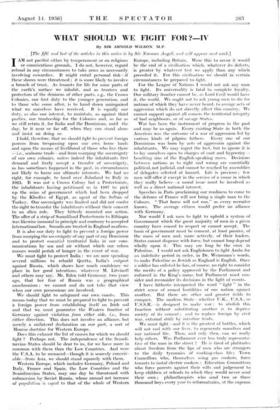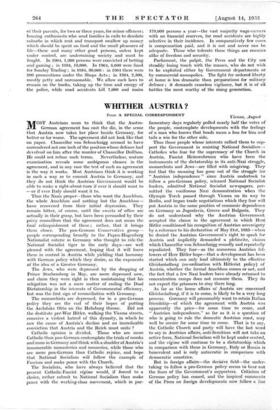WHAT SHOULD WE, FIGHT FOR ?-IV
By SIR ARNOLD WILSON; M.P.
[The NM:and last of the articles in this series is by Sir Norman Angel!, and will appear next week.] IAM not pacifist either. by temperament or on religious or conscientious grounds. I do not, however, regard refusal in any circumstances to take arms as necessarily involving cowardice. It might entail personal risk—if these shores were threatened ; it is more likely to involve a breach of trust. As tenants for • life- for some parts of the earth's surface we inhabit, and as trustees and protectors of the denizens of other parts, e.g., the Crown Colonies, our first duty to the younger generation, and to those who come after, is to hand -down unimpaired What we ourselves have received. It is equally our duty, as also our interest, to maintain, as against third parties, our trusteeship for the Colonies and, so far as we still. retain it, for India and' the Dominions, until the day, belt near or far off, when they can stand alone and insist on doing so.
• I hold, therefore, that we should fight to prevent foreign powers from trespassing upon our own home lands and upon the means of livelihOod of those who live there seaborne trade—and froin usurping the 'sovereignty of. our own .colonits, Unless indeed the inhabitants first demand and freely accept a transfer of sovereignty, as has sometimes happened in the - past, in circumstances -not likely to harrii our ultimate interests. We had no right, for example, to hand over Jubaland to Italy in 1925. - It was not a Crown Colony but a Protectorate, the inhabitants having petitioned us in 1887 to pick up "the reins of government which had been dropped by the Khedive of Egypt, as agent of the Sultan of Turkey. Our sovereignty was limited and did not confer the right to transfer the inhabitants without their consent to an alien rule. They bitterly resented our action. The offer of a strip of Somaliland Protectorate to Ethiopia Was likewise immoral in principle and contrary to accepted international law. Somalis are treated in England as aliens.
It is also our duty to fight to prevent a foreign power from usurping the sovereignty of any part of any Dominion and to protect essential territorial links in our com- munications by sea and air without which our urban masses would perish of hunger in the event of war.
We must fight to protect India : we arc now spending Several Millions • to rebuild Quetta, India's outpost against Russia, which shows how much confidence we place in her good intentions, whatever M. Litvinoff and others may say.- Mr. Eden told Germany, two years ago, that her fear of RusSia was a geographical anachronism : we cannot and do not take that view when our own possessions are involved.
We should fight to safeguard our own coasts. This means today that we must be prepared to fight to prevent a foreign power from establishing itself on Irish soil and that we must guarantee the Western frontier of Germany against violation from either side, i.e., from either direction. This does not involve an alliance, but merely a unilateral declaration on our part, a sort of Monroe doctrine for Western Europe.
Does this exhaust the list of causes for which we should fight ? Perhaps not. The independence of the Scandi- navian States should be dear to us, for we have more in common with them than the Low Countries. And were the U.S.A. to be menaced—though it is scarcely conceiv- able—from Asia, we should stand squarely with them.
Western Europe, which includes Germany, Poland and Italy, -France and Spain, the- Low Countries and the Scandinavian States, may one day be threatened with submersion by Soviet Russia, whose annual net increase of population is -equal to that of the whole of Western Europe, including Britain. Were this to occur it would be the end of a civilisation which, whatever its defects, is greater by whatever test we apply than any which preceded it. For this civilisation we should in certain circumstances be prepared to fight.
For the League of Nations I would not ask any man to fight. Its universality is fatal to complete loyalty. Our military frontier cannot be, as Lord Cecil would have it, the world. We ought not to ask young men to die for nations of which they have never heard, to avenge acts of aggression which do not directly affect this country. We cannot support against all comers the territorial integrity of bad neighbours, or of savage States.
'War has been the instrument of progress in the past and may be so again. Every existing State in both the Americas was the outcome of a war of aggression led by various kinds of pilgrim fathers. Every one of our Dominions was born by acts of aggression against the inhabitants. We may regret the fact, but to ignore it is to lay ourselves open to charges of cant and hypocrisy— besetting' sins of the English-Speaking races. Decisions between nations as to right and wrong are essentially political, not judicial. and cannot be reached by assemblies of delegates selected at hazard. Life is precious ; few men will offer it except in the service of a cause in which they really believe—a moral issue must be involved as Well as a direct national interest.
Speeches in Paris proclaiming our readiness to come to the'defence of France will not bring a single man to the ColourS. " That horse will not run." as every recruiter knows. The average citizen would prefer an alliance with Germany.
Nor would I ask men to fight to uphold a system of Government which the great majority of men in a given country have ceased to respect or cannot accept. The basis of government must be consent. at least passive, of the mass of men and, more actively, of their leaders. States cannot dispense with force, but cannot long depend wholly upon it. This may ere long be the crux in Palestine. I would not ask Englishmen to fight Arabs for an indefinite period in order, in Dr. Weizmann's words, to make Palestine as Jewish as England is English. Once a soldier has enlisted he has, of course, no right to consider the merits of a policy approved by the Parliament and enforced in the King's name, but Parliament must con- sider and reconsider its decisions in the light of events.
I have hitherto interpreted the word " fight " in the strict sense of armed hostilities of one nation against another: But there are other and greater fields to conquer. The modern State—whether U.K., U.S.A., or U.S.S.R.—is designed to make war : to abolish this function without substituting another is to deprive society of its- cement ; and to replace foreign by civil War, external strife by intestine feuds.
We must fight—and it is the greatest of battles, which will not end with our lives, to regenerate ourselves and 'our national life. Then: and only then, can we really help others. Was Parliament ever less truly representa- tive of the man- in the street ? He is tired of platitudes about freedom *Om the lips of men who are strangers to the daily tyrannies of working-class life; Town Councillors- who, themselves using gas cookers; force tenants to instal -electric cookers ; Education Committees who force. parents against their wills and judgement to keep children at schools to which they would never send their own ; philanthropists who send two or three thousand boys every year to reformatories, at the expense of their parents, for two or three years, for minor offences; housing enthusiasts who send families in exile to desolate suburbs in which rent and transport swallow up money, which should be spent on food and the small pleasures of life—these and many other good persons, unless kept tinder control, are undermining -society and must be fought. In 1904, 1,300 persons were convicted of betting and gaming ; in 1934, 13,000. In 1904, 8,000 were fined for Sunday Trading ; in 1934, 30,000: in 1904 there were 200 prosecutions under the Shops Acts ; in 1934, 2,500, mostly petty and unreasonable. We allow such laws to remain on the books, taking up the time and energy of the police, while road accidents kill 7,000 and maim 170,000 persons a year—the vast majority wage-earners with no financial reserves, for road accidents are highly selective in their incidence. In comparatively few eases is compensation paid, and it is not and never can be, adequate. Those who tolerate these things are enemies alike of freedom and security.
Parliament, the pulpit, the Press and the City are steadily losing touch with the masses, who do not wish to be exploited either by Government departments or. by eommercial monopolies. The fight for ordered liberty at home is less dramatic than preparations for military. defence ; it demands ceaseless vigilance, but it is of all battles the most worthy of the rising generation.







































 Previous page
Previous page